Border Collie and Golden
Retriever Advice -
Dog Crates, cages and indoor kennels
- parlour or prison?
|
|
Dog crates, cages or indoor kennels have become easily available in
recent years, used correctly they will become a much loved den and bolt
hole for a dog, incorrectly used they can encourage neglect and lack
of training in lazy or negligent owners.
The main value of a crate is in providing a young puppy with a safe
place to rest and to encourage house training particularly overnight.
However most dogs love to find an enclosed spot, behind the sofa or
under the coffee table for example, where they can feel cosy whilst
keeping an eye on household activities. A crate can create a cosy den
for an adult dog to enjoy but there are do's and don't of which to be
aware.
|
|
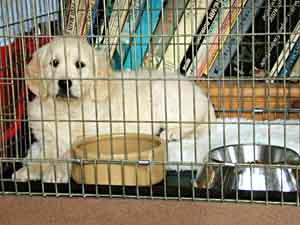
From a human perspective we
associate
cages with prison
|
- A place to lock up a dog or puppy for long periods especially
whilst you are out of the house
- A place to send your dog or puppy as a punishment
- A place to "keep" your dog or puppy
|
|
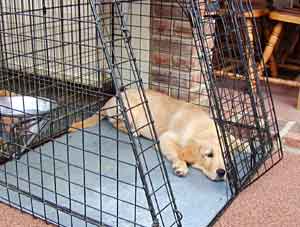
Dusty takes a nap in Cider's
crate
when things get too hectic
|
-
Your puppies bedroom, a place where your puppy can
go to rest safely and without interference whenever she chooses
or when you decide she needs her beauty sleep.
-
A safe place to leave a puppy for SHORT periods
of time and overnight to encourage house training and protect your
puppy from harm when you cannot directly supervise her.
|
|
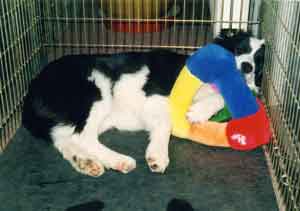
Your puppy should be able to
go to her
crate whenever she chooses
|
Crates and Puppies
For puppies crates serve a variety of very practical uses;
-
Because puppies have a strong instinct not to
foul their immediate environment a crate is very helpful in house
training, your puppy will cry to be let our when she needs to
relieve herself giving you the opportunity to take her straight
outside, supervise her toilet and lavish her with praise for being
so clean.
-
Puppies, like small children are full of mischief,
need close supervision when they are awake and a secure place
to sleep. A crate allows you the confidence to leave your puppy
resting or sleeping in safely so that you can give her your undivided
attention and supervision when she is awake.
-
Puppies have a very high sleep requirement, a
crate is refuge for your puppy from enthusiastic visitors, playmates,
children etc.. Everyone should be told that when puppy is in her
crate she is to left alone in peace to enjoy the rest she needs.
-
In a busy household unused to a young puppy,
routine precautions such as shutting doors and gates, putting
vulnerable possessions away, being mindful of hazards to health
or safety can take a while to instil in to all family members.
During this time an unrestrained or unsupervised puppy is very
much at risk of injury. A crate provides a secure area to put
you puppy whilst people are coming and going, things are being
delivered or when boisterous children are around.
|
|
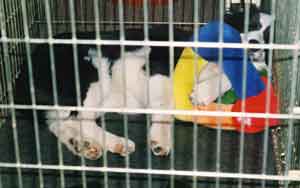
When puppy is asleep, quietly
close the door
|
Crates and Adult Dogs
For an adult dog the benefits of a crate are different, a dog will
still regard her crate a safe refuge when the household gets too
hectic and will want to sleep in her crate at night. When a dog
has learned the rules of the household, the crate door will not
need to be shut but the dog still has a place to call their own,
a place to take their toys or a bone and enjoy a little privacy
and stress-free relaxation.
There are other potential benefits in having a crate for an adult
dog;
-
Travelling or on holiday with your dog she will
have a familiar bedroom and you will certainly have happier hosts
if your dog is not on the bed, sofa etc.
-
If you dog is comfortable and familiar with her
crate she will be happy to rest in it should she ever need to
be "kept quiet" after any veterinary treatment or injury.
-
Your dog needs her own bed and sleeping area anyway
and a crate keeps this contained and easy to clean.
|
|
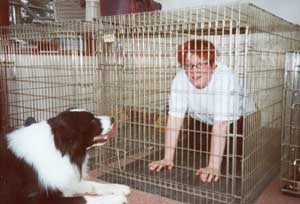
Hercules asks - who's been
sleeping in my bed?
|
|
|
|
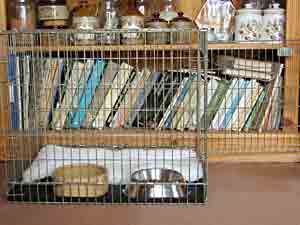
The crate should be left with
the door open
|
|
Introducing Puppy
- Let the puppy into the room - don't try to get her into the crate
or pay any attention to the crate at all.
- Encourage puppy to play with a toy and slowly move the game close
to the crate.
- If your puppy is keen on the toy throw the toy to the edge of the
crate door and gradually just inside the door - DON'T TRY TO SHUT
THE DOOR.
- If your puppy is not keen on the toy use a tit bit to encourage
her towards the crate and gradually throw little pieces of titbit
just inside the crate.
- Once your puppy is comfortable going into the crate to get her toy
or titbit finish the game, take her outside to empty herself and then
let her explore the room by herself. She will know from her earlier
experience that her food and water are inside the crate.
- When she goes into the crate to drink or eat praise her.
- When she starts to show signs of tiredness encourage her towards
the crate with her toy or titbit but do not put her in the crate if
she chooses to sleep outside it.
- Eventually sometimes after a few sessions like this she will settle
in the crate to sleep.
- When your puppy is asleep in the crate very quietly close and latch
the door and latch the door without waking her.
- As soon as your puppy wakes up open the crate and take her straight
outside to empty herself.
- After a short while you will be able lead your puppy straight in
to her crate with a toy or titbit, at this point introduce a command
such as "in your bed" so that in a short time your puppy
will go to her crate when told to do so.
- Get in the habit of putting your puppy in her crate at all sorts
of times not just when things are busy or she may become resentful
of her crate because she feels she is being left out.
|
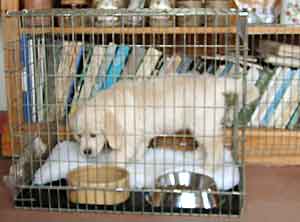
This puppy is happy to explore
her new crate -
the door is left open
|
- Always remove your puppies collar before putting her in her crate
or she could get the buckle caught on the bars and strangle herself.
- Watch your puppy carefully until you are satisfied that she will
not try to chew the bars or she could get her mouth caught.
- Watch your puppy carefully until you are satisfied that she will
not try to claw through the bars or she could get her paw caught.
- Sometimes puppies sleep better the first few nights if the crate
is covered (especially by a garment or blanket carrying your scent),
if you cover the crate make sure that there is plenty of air movement
and no risk if suffocation.
|
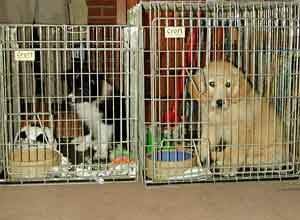
Always make sure that your
puppy's
crate is large enough
|
- Do not leave your puppy or adult dog in her crate for long periods,
for puppies an hour is quite long enough and for adult dogs 2 hours
is about the maximum, the exception to this is of course sleeping
overnight..
- A crate is only a place for your puppy or dog to sleep, it is their
bedroom not their home. If you don't have time to spend with a puppy
or dog or are not around at home during the day - don't get a dog
or a puppy.
- A crate is not an excuse for not teaching your dog how to behave
in the house an adult dog should not need to be locked in their crate
but should be able to use it freely with the door open.
- Getting your puppy used to a crate may take time and patience, not
rush things and never loose your temper.
- Don't rush to let your puppy out of the crate every time she cries,
if you are sure she does not need to relieve herself ignore, her she
is training you to come when called!
- If your puppy is very stubborn about going to her crate and you
are satisfied that she understands what she is being told to do be
very firm, pick her up quietly and without talking to her put her
in the crate, shut and latch the door and walk away without talking
to or fussing her.
- Always ensure your dog or puppy has access to fresh water whilst
in a crate.
|
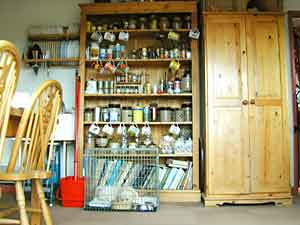
The crate should be sited in
a busy,
bright and draught free area.
|
|
|








